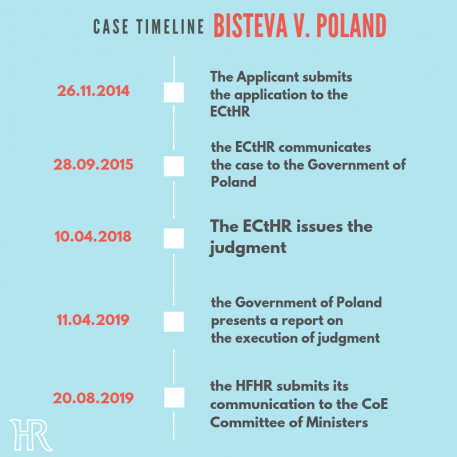
Has Poland fully executed ECtHR’s judgment on Chechen family’s detention? HFHR’s communication to CoE’s Committee of Ministers
♦ In September, the Council of Europe’s Committee of Ministers will address, among other issues, the execution of judgments of the European Court of Human Rights. Currently, the Committee supervises the execution of judgments in 94 Polish cases, including Bistieva v. Poland.
♦ The HFHR has communicated to the Committee its opinion on Poland’s report on the implementation of the ECHR judgment in Bistieva. The case concerns immigration detention of a family of refugees with children, which lasted for 5 months and 20 days. In Bistieva, the Strasbourg Court ruled that Poland had violated the applicant’s right to family life under Article 8 ECHR.
♦ The Government contends that Poland has fulfilled its obligations to execute the judgment. However, the experience of the HFHR, other NGOs and national human rights institutions shows that no sufficient regard is given to the best interests of the child in matters relating to the immigration detention of refugee families.
Case of a Chechen family
On 10 April 2018, the European Court of Human Rights delivered the judgment in the case of Bistieva and Others v. Poland. The case concerned the HFHR’s clients – a Chechen family who came to Poland and unsuccessfully applied for the refugee status in 2013. In January 2014, the mother and children were detained at the Guarded Centre for Foreigners in Kętrzyn. During their placement at the centre, the family repeatedly re-applied for the refugee status.
ECtHR’s judgment
In Bistieva, the Court found a violation of the right to family life. ECtHR held that the violation resulted from Polish authorities’ failure to take into account the best interests of children in deciding to detain the asylum seekers. The Court further held that Polish authorities should have considered the application of non-custodial measures and that detention should be only the measure of last resort. The ECtHR also made note that the period of detention (5 months and 20 days) was too long.
Government’s report
On 11 April 2019, the Government of Poland presented the Committee of Ministers with a report on the measures taken to implement the Bistieva judgment. According to the report, measures alternative to immigration detention at a guarded centre have since been introduced to the Polish law. Poland also stated that such alternative measures were commonly used. The Government noted that contents of the ECtHR’s judgment had been notified to personnel of immigration services. Given the above, the Government expressed the view that Poland has fulfilled its obligations to execute the judgment in question.
HFHR’s communication and recommendations concerning the execution of ECtHR’s judgment
The HFHR has commented on the case in its communication sent to the Council of Europe’s Committee of Ministers. In its communication, the Foundation pointed out that the experience of non-governmental organisations and national human rights institutions showed that in immigration detention proceedings Polish authorities fail to properly take into account the principle of assessing the best interests of the child. Available statistics show that more than 1100 children stayed in guarded immigration centres in 2014-2017. Moreover, studies of the jurisprudence of Polish courts in cases concerning detention of refugees indicate that the courts rarely pay attention to the individual situation of children. Accordingly, the court’s assessment of the best interests of a child is usually limited to stating that these interests are safeguarded as the child is placed in a guarded centre together with the parents. Moreover, courts usually order immigration detention for the maximum period permitted by law.
“It cannot be said that the Bistieva judgment has been executed by Poland. Further action is needed to prevent similar violations”, says Jacek Białas, HFHR’s lawyer representing foreigners in proceedings before the ECtHR. “The case is precedential because the ECtHR’s judgment is the only judgment of an international body concerning immigration detention of refugees, among them children. This topic should be included in the discussion on the detention of refugee children in Poland, but also should have an impact on the jurisprudence of Polish courts in matters of detention of immigrant children”, Mr Białas concludes.
HFHR’s recommendations made in the communication:
- Judges and Border Guard officers should receive proper training on applying the principle of the best interests of the child and the ECtHR’s case law in cases of immigration detention of minors.
- Guidelines for the specific actions to be taken should be prepared.
- The courts must examine, on a case-by-case basis, the best interests of the child in all matters concerning immigration detention, also by hearing the children concerned or experts.
- All court decisions to place a family in a guarded centre must incorporate a personalised assessment of the situation of the affected children.
Moreover, the HFHR recommended that the Committee should request the Government to provide statistics on the number of adult and minor detainees of the guarded centres.
Download
- ECtHR’s Final Judgment in the case of Bistieva and Others v. Poland
- ACTION REPORT Information on measures taken to implement the judgment in the case of Bistieva and Others against Poland
- Communication from the Helsinki Foundation for Human Rights concerning execution of ECtHR’s in case Bisteva and others against Poland
- Communication from the Helsinki Foundation for Human Rights in the case of Bistieva
and Others v. Poland and Polish Government’s Response
Related links
- Strasbourg Court’s first judgment on immigrant detention in Poland
- “A judgment in Strasbourg is not the end!” Report on the execution of judgement of the European Court of Human Rights


05.09.2019
 Cookies EN
Cookies EN